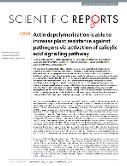Actin depolymerization is able to increase plant resistance against pathogens via activation of salicylic acid signalling pathway

Autor
Kalachova, Tetiana
Trdá, Lucie
Pospíchalová, Romana
Lamparová, Lucie
Malínská, Kateřina
Burketová, Lenka
Valentová, Olga
Janda, Martin
Datum vydání
2019Publikováno v
Scientific ReportsRočník / Číslo vydání
9 (1)ISBN / ISSN
ISSN: 2045-2322ISBN / ISSN
eISSN: 2045-2322Informace o financování
UK//Q46
MSM//SVV260427
UK//GAUK992416
Metadata
Zobrazit celý záznamKolekce
Tato publikace má vydavatelskou verzi s DOI 10.1038/s41598-019-46465-5
Abstrakt
The integrity of the actin cytoskeleton is essential for plant immune signalling. Consequently, it is generally assumed that actin disruption reduces plant resistance to pathogen attack. Here, we demonstrate that actin depolymerization induced a dramatic increase in salicylic acid (SA) levels in Arabidopsis thaliana. Transcriptomic analysis showed that the SA pathway was activated due to the action of isochorismate synthase (ICS). The effect was also confirmed in Brassica napus. This raises the question of whether actin depolymerization could, under particular conditions, lead to increased resistance to pathogens. Thus, we explored the effect of pretreatment with actin-depolymerizing drugs on the resistance of Arabidopsis thaliana to the bacterial pathogen Pseudomonas syringae, and on the resistance of an important crop Brassica napus to its natural fungal pathogen Leptosphaeria maculans. In both pathosystems, actin depolymerization activated the SA pathway, leading to increased plant resistance. To our best knowledge, we herein provide the first direct evidence that disruption of the actin cytoskeleton can actually lead to increased plant resistance to pathogens, and that SA is crucial to this process.
Klíčová slova
age-related resistance, nonhost resistance, arabidopsis, dynamics, platform, susceptibility, accumulation, cytoskeleton, interplay, phase
Trvalý odkaz
https://hdl.handle.net/20.500.14178/1622Licence
Licence pro užití plného textu výsledku: Creative Commons Uveďte původ 4.0 International







